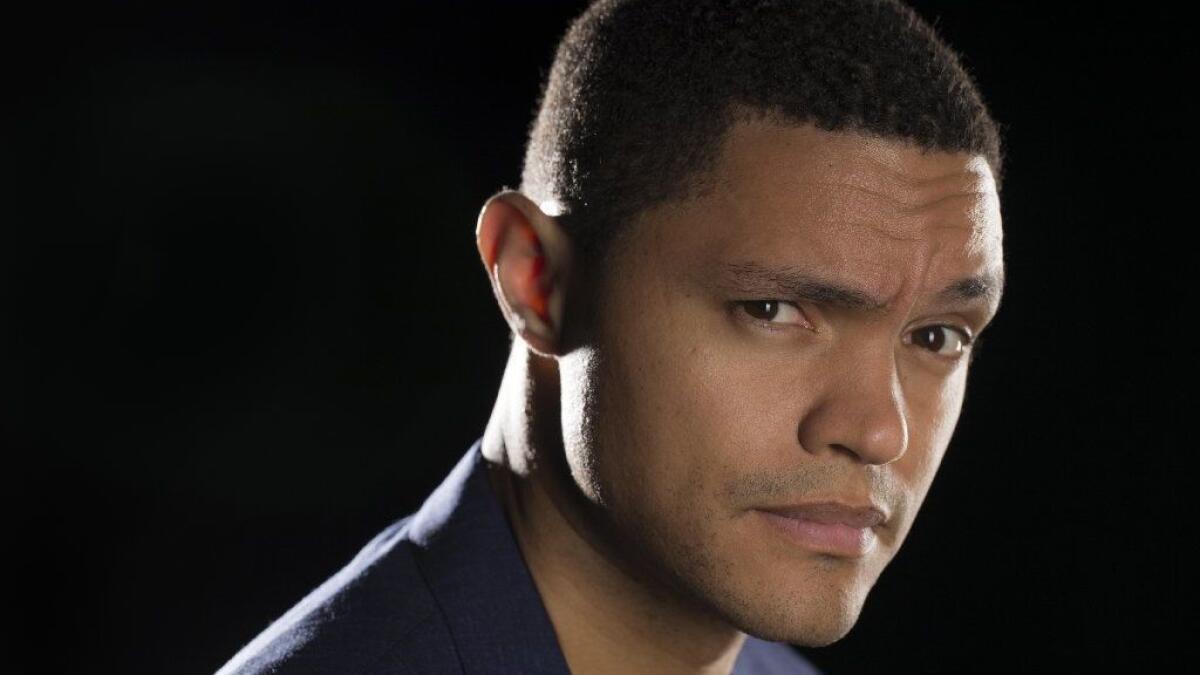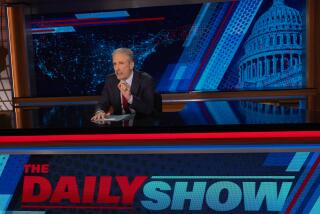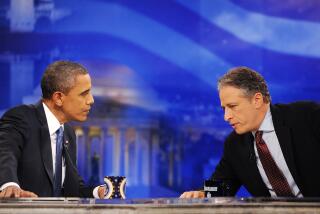‘Daily Show’s’ Trevor Noah finds his way to the funny with some on-the-job training

In 2015, the young South African comic and television personality Trevor Noah took on one of the true good news/bad news gigs in entertainment. The good news: He went from obscurity in America to hosting his own national show, inheriting the infrastructure and audience of a popular program. The bad news: He had to follow the sainted Jon Stewart and the sky-high standards he’d set for “The Daily Show.”
After early struggles, the audience of “The Daily Show With Trevor Noah” has not only stabilized, but grown considerably — especially in key demos. The show is starting to collect awards and nominations again (including an Emmy win last year for the off-the-cuff “Between the Scenes” web segments). Noah’s autobiography, “Born a Crime,” was a No. 1 bestseller, has Oscar winner Lupita Nyong’o attached to the film version and is being taught in Newark, N.J., schools. The 34-year-old recently launched an educational foundation in South Africa and signed a multiyear, first-look deal with Viacom. We’re seeing the rise of Noah’s arc.
WATCH: Video Q&A’s from this season’s hottest contenders »
You had a strong pedigree as a comedian — especially as a stand-up — in South Africa. But the “Daily Show” gig is much more than stand-up; it’s more than comedy. The interviews involve research, an understanding of U.S. politics; actual journalism. Some of the writing staff stayed in place, but how did you approach that side of the job?
I’d be lying if I said I was confident taking that on. I had to immerse myself in literature, in history books, in the writings of scholars and every thought leader I could think of before I took the job. It’s not easy to luck your way through “The Daily Show.” I think, were I more confident, I might have erred on the side of the arrogant and not tried to learn as much as I did. I knew it was a Herculean task and I tried to give it the respect the job deserves.
I’ll never know all the answers; what I want to do is get to a place where I know how to ask most of the questions.
What are some interviews that have really impressed you?
[Gen.] Michael Hayden blew my mind because here he was, the ex-head of the CIA and the NSA, saying to me that he wasn’t sure that America’s drone warfare was the best way to go about fighting terrorism in the Middle East. That’s [interesting, when] they’re willing to admit that maybe their worldview had shifted over time.
Recently we had Diane Guerrero on the show, from “Orange Is the New Black” and “Jane the Virgin.” She shared her story of being a child born in America, separated from her parents, who were immigrants, undocumented; they were deported and she had to grow up without them. Learning about this from an actual human being and not the statistics that are espoused on the news was a really different conversation to have.
How did you react when “Born a Crime” was made part of the curriculum in Newark?
To go from a kid who was always in trouble for something or other, to now have my book being taught in school is quite a jump. I don’t think the book is a product of myself, but rather me telling a story comprised of many stories. Part of it is South Africa’s story, part of it is my family’s story, my mother’s story, the lessons she taught me. Then, obviously, my interpretation of the world I was raised in. It’s most beautiful to me because of why they’re using the book. I do think the lessons we learned in apartheid South Africa are stories that apply to the world. You do see vestiges of that in America today. It’s an easy story to understand because South Africa’s racism was so blatant and so unavoidable. I think it’s a nice place to learn how to have conversations on a topic that has become very fraught with political landmines everywhere you go.
What has been one of your most important on-the-job lessons so far?
Many of the people you deal with in politics are doing what they think is right, according to their point of view. There are a few disingenuous bad actors who know how they’re contorting facts or reality or issues to mobilize people in the direction they desire. But it’s really, really hard, and it took me a while to realize, that many people genuinely are pursuing the direction they believe is correct. So I had to learn how to deal with those people in an empathetic way as opposed to in a condescending way. I don’t have to agree with you; I don’t have to think that you are right. But I will do my utmost to treat you as the human being I hope you would treat me as.
More to Read
From the Oscars to the Emmys.
Get the Envelope newsletter for exclusive awards season coverage, behind-the-scenes stories from the Envelope podcast and columnist Glenn Whipp’s must-read analysis.
You may occasionally receive promotional content from the Los Angeles Times.






